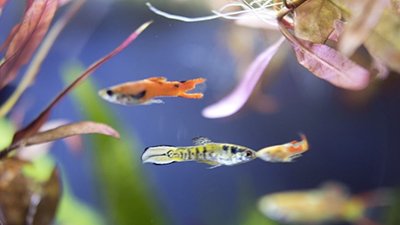
Mustard Plant Adaptation: Evolution or Selection?
News Source
- The Sydney Morning Herald: “Weeds signal evolution explosion“
Out-of-control weeds sprouting from an “evolution explosion”: the plot of a late-night thriller or hot news? It’s the latter according to US scientists, reports Sydney’s Herald: “Fast-growing weeds have evolved over a few generations to adapt to climate change … [t]he weeds will likely keep up with any attempts to develop crops that can adapt to global warming.”
So what is this evolution explosion, really? The article explains that Arthur Weis, professor of ecology and evolutionary biology in the University of California system, experimented on groups of field mustard plants (one group grown from seeds collected before a five-year drought; the other from seeds collected after the drought). Weis discovered that plants grown from the post-drought seeds reproduced earlier than those grown from seeds procured from before the drought. Weis offered a “crude analogy” to help illustrate:
[I]f humans evolved at the same rate as the mustard plants in the experiment, the average onset of the age of reproduction in humans would slip from 16 years to 13 1/2 in seven generations.
Plants grown from the post-drought seeds reproduced earlier than those grown from seeds procured from before the drought.
Of course, what this “experiment in evolution” failed to highlight was that no new genetic information was added to the field mustard plants. Rather, the seed lines with the pre-existing genetic “programming” for early reproduction survived, and ones programmed for late reproduction reproduced unsuccessfully.
To offer our own “crude analogy,” if all human food was stashed in cubbyholes accessible only through narrow apertures, humans with the genetic programming for small hands, wrists, and forearms would be most likely to survive, as they could reach the stored food while other, larger-armed humans would fail. In this sense, it would be an “explosion” of evolution toward smaller-armed, thinner-wristed humans. But in neither the mustard experiment nor in the analogies was any genetic information added; without the addition of new genetic “programs” (which have never been observed, anyway) “uphill” evolution from molecules to men is impossible.
Interestingly, the University of California-Irvine press release announcing this story begins:
Countering Charles Darwin’s view that evolution occurs gradually, UC Irvine scientists have discovered that plants with short life cycles can evolutionally adapt in just a few years to climate change.
Indeed, this sort of rapid, “downhill” evolution is exactly the sort we’d expect when starting from the Bible. Natural Selection, operating on the animal kinds that walked (or flew, etc.!) off the Ark, would have encouraged rapid speciation that has led to the diversity of life we see today. In other words, scientists’ observations line up with the biblical worldview, and give no credence to the tale of evolution.
For More Information: Get Answers
Remember, if you see a news story that might merit some attention, let us know about it! (Note: if the story originates from the Associated Press, FOX News, MSNBC, the New York Times, or another major national media outlet, we will most likely have already heard about it.) And thanks to all of our readers who have submitted great news tips to us. If you didn’t catch all the latest News to Know, why not take a look to see what you’ve missed?
(Please note that links will take you directly to the source. Answers in Genesis is not responsible for content on the websites to which we refer. For more information, please see our Privacy Policy.)
Recommended Resources

Answers in Genesis is an apologetics ministry, dedicated to helping Christians defend their faith and proclaim the good news of Jesus Christ.
- Customer Service 800.778.3390
- Available Monday–Friday | 9 AM–5 PM ET
- © 2026 Answers in Genesis





